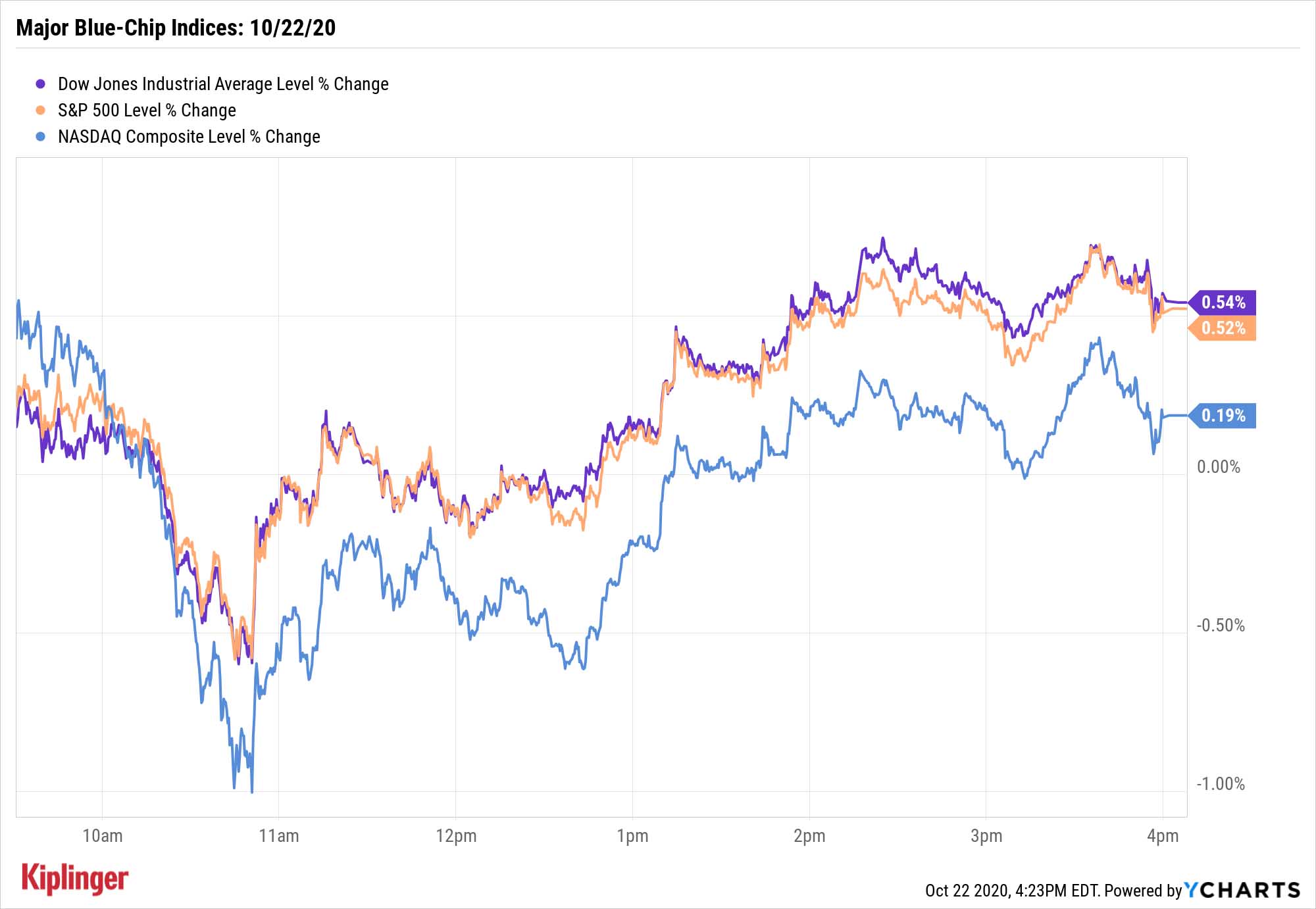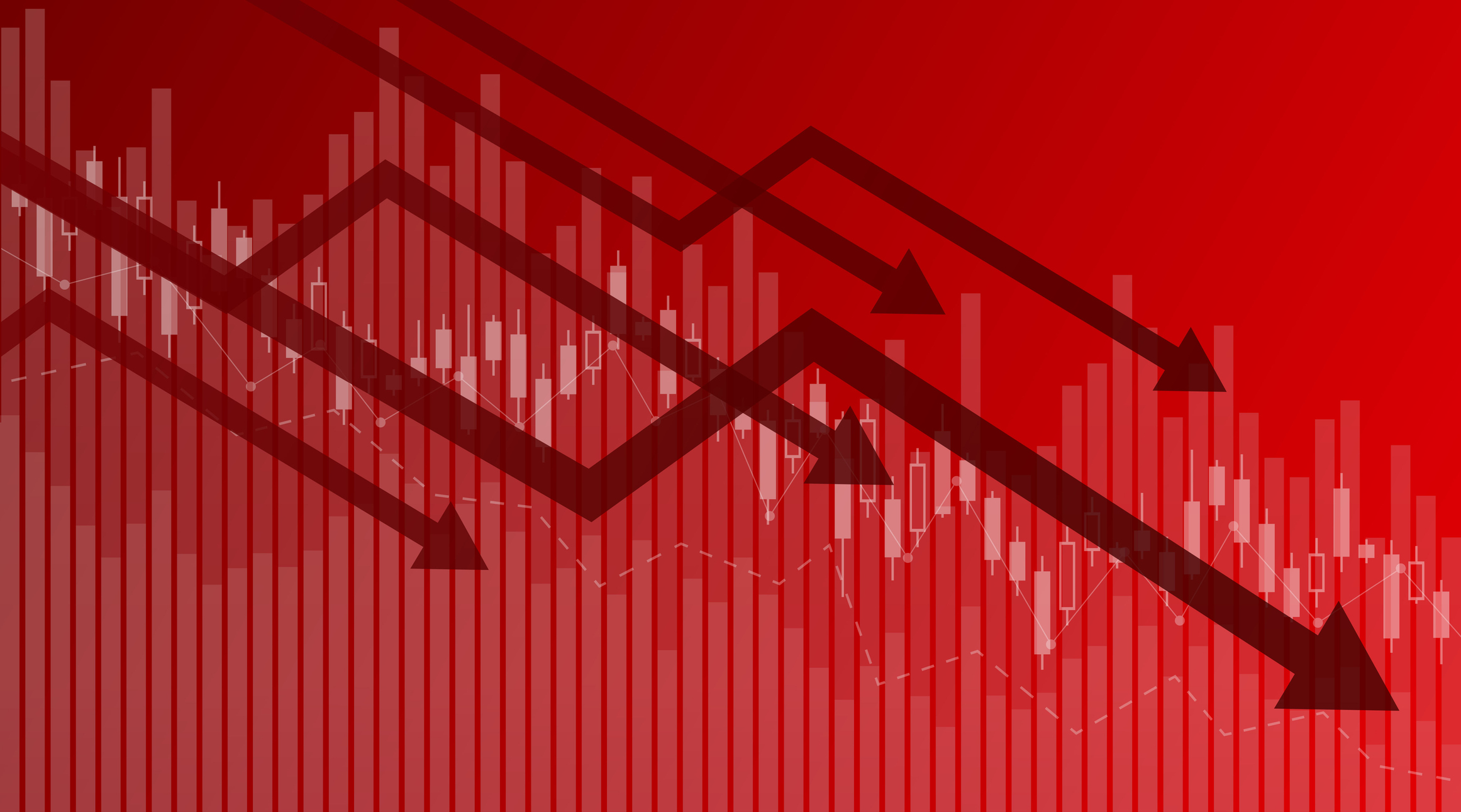Stock Market Today: Stimulus' Siren Song Pulls the Bulls Along
Thursday's gains were driven by more positive language on stimulus negotiations, but an uncertain timeline kept those advances modest.


Profit and prosper with the best of Kiplinger's advice on investing, taxes, retirement, personal finance and much more. Delivered daily. Enter your email in the box and click Sign Me Up.
You are now subscribed
Your newsletter sign-up was successful
Want to add more newsletters?

Delivered daily
Kiplinger Today
Profit and prosper with the best of Kiplinger's advice on investing, taxes, retirement, personal finance and much more delivered daily. Smart money moves start here.

Sent five days a week
Kiplinger A Step Ahead
Get practical help to make better financial decisions in your everyday life, from spending to savings on top deals.

Delivered daily
Kiplinger Closing Bell
Get today's biggest financial and investing headlines delivered to your inbox every day the U.S. stock market is open.

Sent twice a week
Kiplinger Adviser Intel
Financial pros across the country share best practices and fresh tactics to preserve and grow your wealth.

Delivered weekly
Kiplinger Tax Tips
Trim your federal and state tax bills with practical tax-planning and tax-cutting strategies.

Sent twice a week
Kiplinger Retirement Tips
Your twice-a-week guide to planning and enjoying a financially secure and richly rewarding retirement

Sent bimonthly.
Kiplinger Adviser Angle
Insights for advisers, wealth managers and other financial professionals.

Sent twice a week
Kiplinger Investing Weekly
Your twice-a-week roundup of promising stocks, funds, companies and industries you should consider, ones you should avoid, and why.

Sent weekly for six weeks
Kiplinger Invest for Retirement
Your step-by-step six-part series on how to invest for retirement, from devising a successful strategy to exactly which investments to choose.
We're "just about there."
Those were the words House Speaker Nancy Pelosi used Thursday to describe COVID-19 relief negotiations with the White House, helping to spark some cautious optimism in stocks. However, Pelosi was circumspect about the timetable for crafting and passing new stimulus legislation once agreement is reached on the outline of a deal.
Also Thursday, the Labor Department said unemployment claims for last week finally fell below the 800,000 mark (to 787,000), providing ammunition for those in Washington who believe the economy can recover without additional spending.
From just $107.88 $24.99 for Kiplinger Personal Finance
Become a smarter, better informed investor. Subscribe from just $107.88 $24.99, plus get up to 4 Special Issues

Sign up for Kiplinger’s Free Newsletters
Profit and prosper with the best of expert advice on investing, taxes, retirement, personal finance and more - straight to your e-mail.
Profit and prosper with the best of expert advice - straight to your e-mail.
"While recent declines in continuing claims largely reflect the transition of unemployed individuals from state-level programs to the federal PEUC program, overall trends in claims still point to incremental improvement in labor markets," write Michael Gapen and Jonathan Millar of Barclays Investment Bank, adding that the release of California’s revised data allowed "for a clearer picture of recent trends."
Financial stocks including American Express (AXP, +3.3%) and JPMorgan Chase (JPM, +3.5%) were bid higher, the latter also generating excitement over its new payments service, QuickAccept, meant to take on the likes of PayPal (PYPL) and Square (SQ). Gains from the likes of Chevron (CVX, +3.6%) and Boeing (BA, +3.2%) also helped the Dow Jones Industrial Average finish up 0.5% to 28,363.
Other action in the stock market today:
- The S&P 500 advanced 0.5% to 3,453.
- The Nasdaq Composite improved by 0.5% to 28,363.
- The Russell 2000 got a 1.6% jolt higher to 1,629.
- Gilead Sciences (GILD) was up more than 3% in early post-market trading after the Food and Drug Administration approved its remdesivir as a coronavirus treatment. The FDA had previously granted the drug an emergency-use authorization.

Get Your Income In Order
We continue to stress the importance of viewing the market through a long-term lens right now. Stimulus might not be just around the bend, especially in the wake of improving jobs data.
Among the ways you can adjust your portfolio amid so much uncertainty is by making sure your income-generating allocation is delivering the goods.
Dividend Aristocrats – especially those trading at a bargain – are solid holdings for those prioritizing dividend safety. But as a group, their yields can be lacking – consider that the ProShares S&P 500 Dividend Aristocrats ETF (NOBL) that invests in these dividend-growing phenoms yields a modest 2.2%. If you need more income than that, these 25 analyst favorites yielding between 3.3% and 8.2% might be more your speed.
And these 10 dividend-paying companies from across the bond can kill two birds with one stone: Not only do they deliver regular income checks, but they also provide important geographical diversification, which can sometimes help smooth out returns during times when U.S. stocks aren't at their best.
Profit and prosper with the best of Kiplinger's advice on investing, taxes, retirement, personal finance and much more. Delivered daily. Enter your email in the box and click Sign Me Up.
Kyle Woodley is the Editor-in-Chief of WealthUp, a site dedicated to improving the personal finances and financial literacy of people of all ages. He also writes the weekly The Weekend Tea newsletter, which covers both news and analysis about spending, saving, investing, the economy and more.
Kyle was previously the Senior Investing Editor for Kiplinger.com, and the Managing Editor for InvestorPlace.com before that. His work has appeared in several outlets, including Yahoo! Finance, MSN Money, Barchart, The Globe & Mail and the Nasdaq. He also has appeared as a guest on Fox Business Network and Money Radio, among other shows and podcasts, and he has been quoted in several outlets, including MarketWatch, Vice and Univision. He is a proud graduate of The Ohio State University, where he earned a BA in journalism.
You can check out his thoughts on the markets (and more) at @KyleWoodley.
-
 Nasdaq Leads a Rocky Risk-On Rally: Stock Market Today
Nasdaq Leads a Rocky Risk-On Rally: Stock Market TodayAnother worrying bout of late-session weakness couldn't take down the main equity indexes on Wednesday.
-
 Quiz: Do You Know How to Avoid the "Medigap Trap?"
Quiz: Do You Know How to Avoid the "Medigap Trap?"Quiz Test your basic knowledge of the "Medigap Trap" in our quick quiz.
-
 5 Top Tax-Efficient Mutual Funds for Smarter Investing
5 Top Tax-Efficient Mutual Funds for Smarter InvestingMutual funds are many things, but "tax-friendly" usually isn't one of them. These are the exceptions.
-
 I'm a 55-Year-Old Dad. Here’s How My 28-Year-Old Daughter Showed Me That AXP Is Still a Solid Investment
I'm a 55-Year-Old Dad. Here’s How My 28-Year-Old Daughter Showed Me That AXP Is Still a Solid InvestmentAmerican Express stock is still a solid investment because management understands the value of its brand and is building a wide moat around it.
-
 Nasdaq Slides 1.4% on Big Tech Questions: Stock Market Today
Nasdaq Slides 1.4% on Big Tech Questions: Stock Market TodayPalantir Technologies proves at least one publicly traded company can spend a lot of money on AI and make a lot of money on AI.
-
 Stocks Close Down as Gold, Silver Spiral: Stock Market Today
Stocks Close Down as Gold, Silver Spiral: Stock Market TodayA "long-overdue correction" temporarily halted a massive rally in gold and silver, while the Dow took a hit from negative reactions to blue-chip earnings.
-
 If You'd Put $1,000 Into AMD Stock 20 Years Ago, Here's What You'd Have Today
If You'd Put $1,000 Into AMD Stock 20 Years Ago, Here's What You'd Have TodayAdvanced Micro Devices stock is soaring thanks to AI, but as a buy-and-hold bet, it's been a market laggard.
-
 Dow Rises 313 Points to Begin a Big Week: Stock Market Today
Dow Rises 313 Points to Begin a Big Week: Stock Market TodayThe S&P 500 is within 50 points of crossing 7,000 for the first time, and Papa Dow is lurking just below its own new all-time high.
-
 Nasdaq Leads Ahead of Big Tech Earnings: Stock Market Today
Nasdaq Leads Ahead of Big Tech Earnings: Stock Market TodayPresident Donald Trump is making markets move based on personal and political as well as financial and economic priorities.
-
 If You'd Put $1,000 Into UPS Stock 20 Years Ago, Here's What You'd Have Today
If You'd Put $1,000 Into UPS Stock 20 Years Ago, Here's What You'd Have TodayUnited Parcel Service stock has been a massive long-term laggard.
-
 Visa Stamps the Dow's 398-Point Slide: Stock Market Today
Visa Stamps the Dow's 398-Point Slide: Stock Market TodayIt's as clear as ever that President Donald Trump and his administration can't (or won't) keep their hands off financial markets.
